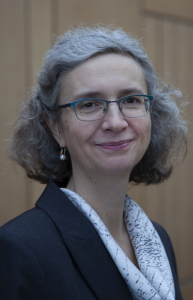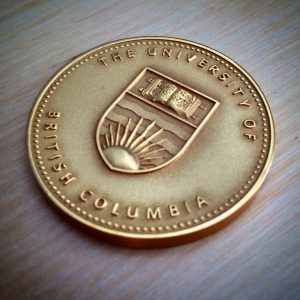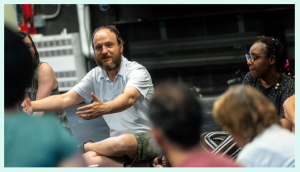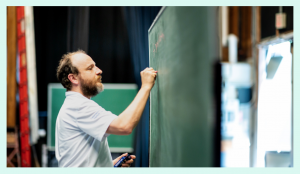Farah Brings Theatro do Oprimido (Theatre of the Oppressed) Practices to the World
 Dr Farah Shroff, of the School of Population and Public Health and the Department of Family Practice in UBC’s Faculty of Medicine, integrates theatre work into her work in various ways. Her UBC courses include theatre exercises that help to uncover dynamics of public health issues. Dr Shroff also applies theatre exercises in her global health work; in India, university students and faculty have been particularly receptive to theatre, given the saturation of drama culture through Bollywood. Given that Teatro do Oprimidois a technique emanating from Brazil, by Augusto Boal, Dr Shroff likes to situate this social justice work as a form of knowledge from the Global South. Dr Shroff’s feminist, anti-racism, and diversity work is enhanced by Teatro do Oprimido. She also applies active teaching in other ways and is a published poet, budding video maker, dancer, and lover of creative expression.
Dr Farah Shroff, of the School of Population and Public Health and the Department of Family Practice in UBC’s Faculty of Medicine, integrates theatre work into her work in various ways. Her UBC courses include theatre exercises that help to uncover dynamics of public health issues. Dr Shroff also applies theatre exercises in her global health work; in India, university students and faculty have been particularly receptive to theatre, given the saturation of drama culture through Bollywood. Given that Teatro do Oprimidois a technique emanating from Brazil, by Augusto Boal, Dr Shroff likes to situate this social justice work as a form of knowledge from the Global South. Dr Shroff’s feminist, anti-racism, and diversity work is enhanced by Teatro do Oprimido. She also applies active teaching in other ways and is a published poet, budding video maker, dancer, and lover of creative expression.
 Pia Smets, part of our Community of Practice, made strides in bringing Conflict Theatre to her work environment. Working as a Research Associate, Pia used to find that her main mode of dealing with conflict was prevention. By building relationships, Pia hoped to become aware of issues before they reached explosive status. While taking steps to prevent conflict is good practice, conflict is inevitable and healthy. When Conflict Theatre came to the Faculty of Forestry with an event called ‘Fail Better’, she was hooked.
Pia Smets, part of our Community of Practice, made strides in bringing Conflict Theatre to her work environment. Working as a Research Associate, Pia used to find that her main mode of dealing with conflict was prevention. By building relationships, Pia hoped to become aware of issues before they reached explosive status. While taking steps to prevent conflict is good practice, conflict is inevitable and healthy. When Conflict Theatre came to the Faculty of Forestry with an event called ‘Fail Better’, she was hooked.
Amrit Receives President’s Award for Creativity & Innovation
 Amrit, a member of our Community of Practice, recently gained recognition for engaging with Conflict Theatre in the work environment. Amrit received the 2019 President’s Award for Creativity and Innovation for integrating Conflict Theatre into programs such as Managing@UBC and the Academic Leadership Development Program.
Amrit, a member of our Community of Practice, recently gained recognition for engaging with Conflict Theatre in the work environment. Amrit received the 2019 President’s Award for Creativity and Innovation for integrating Conflict Theatre into programs such as Managing@UBC and the Academic Leadership Development Program.
Partnering with Human Resources, the Department of Theatre and Film, the Equity and Inclusion office, and the Centre for Teaching, Learning, and Technology, she was a key figure in bringing Conflict Theatre to UBC.
Read more about Amrit’s success bringing Conflict Theatre to the work environment on the UBC’s President’s Awards page.
Tom Brings Conflict Theatre to Academia

A paper written by our joker, Tom Scholte, applied systems of thinking to some interventions from a Conflict Theatre performance at Sauder School of Business last year. An international jury of 6 scholars placed this paper in the Top 25% best papers at the World Multi-Conference on Systemics, Cybernetics, and Informatics in Orlando, Florida. This paper went on to be published in the and was published in the Journal on Systemics, Cybernetics and Informatics (JSCI). It was a helpful primer on Perceptual Control Theory; a tool for goals and desires in people.
A key member in facilitating and running Conflict Theatre @ UBC, Tom has worked to bring conflict theatre to a bigger stage, and his research into the subject makes strides for the recognition of Conflict Theatre at a global scale.
Tom Applies Systems Thinking to Conflict Theatre

In another paper from our very own joker, Tom Scholte, Conflict Theatre and systems thinking are studied together in an effort to explore social modelling. In other words, people are complicated, so Tom’s paper focused on how the experiences of every individual person could be influential in how they interact with their environment. Tom’s paper seeks to develop models of acknowledging those feelings and experiences.
A key member in facilitating and running Conflict Theatre @ UBC, Tom has worked to bring conflict theatre to a bigger stage, and his research into the subject makes strides for the recognition of Conflict Theatre in the academic hemisphere.
Please submit your news to share to conflict.theatre@ubc.ca.